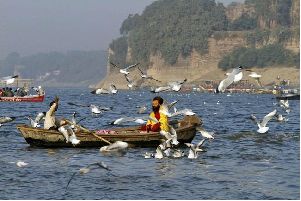|
o north Indian river fit for bathing: Environmental activists
The Times of India
25th December, 2012
|

|
New Delhi: The famed rivers of India's Gangetic plains are turning into "sewage", threatening the life and health of millions of people dependent on them, warned a team of 11 environmental activists who cycled through the region covering around 1,800km in 27 days. In the capital earlier this week on way to their final stop, Dehra Dun, team members they crossed 24 rivers while cycling through north Bengal, Bihar and Uttar Pradesh. "Not one river was fit to bathe in. The water at many places resembled sewage water. Among the most polluted rivers we came across was the Yamuna in western UP, Varuna and Gandak," said team leader Anil P Joshi, a Padma Shri-awardee who heads a Dehra Dun-based environmental NGO, HESCO. "The growing pollution of rivers is a stark sign of wider ecological imbalance in the region," he added. The yatra aims to raise awareness about the need for keeping an account of India's natural resources. The group is demanding that the government introduce an annual green measure called the 'gross environmental product'. "Like the GDP for the economy, the GEP would monitor the health of India's natural assets, showing whether these were being overexploited or not," said Joshi. It wasn't just the rivers that the activists were worried about. They said none of the states they travelled through had achieved even half of India's target of 33% area under forests. Bengal had 14.64%, Bihar 7.23%, UP 3.61% and Delhi 11.94%. "Forests are vanishing in these states. And even the ones that survive are grade C forests, consisting of bushes rather than broad-leaved trees," Joshi said.
"We will compile a report of our observations, which will be sent to the Prime Minister's Office and to all chief ministers," Joshi said.